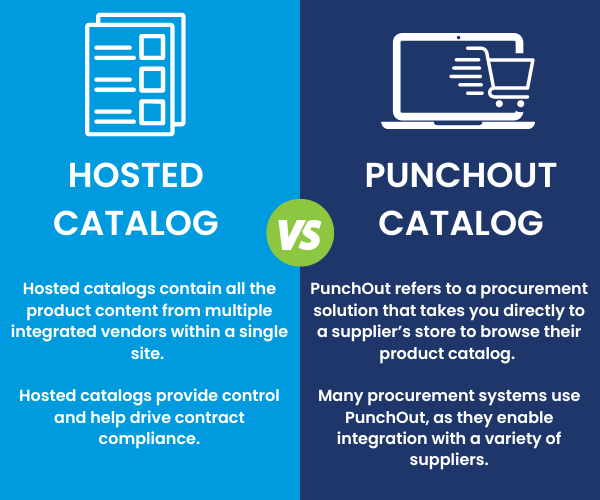Table of Contents
Modern eProcurement demands continue to grow as buyers adopt new technology and expect suppliers to support digital purchasing channels. To meet these expectations, organizations must choose the right catalog model for their digital purchasing workflows.
A key decision is whether to use a hosted catalog or a PunchOut catalog. Each option offers benefits depending on product complexity, update frequency, and integration needs, and choosing the right approach can help suppliers increase revenue through their eCommerce store while strengthening relationships with trading partners.
What is a Hosted Catalog?
A hosted catalog is a static product file, typically in CSV, XML, or CIF format, that a supplier provides for the buyer to load into their eProcurement system. Once uploaded, buyers can search for and order items directly within their platform. Unlike a PunchOut catalog, which pulls live data from the supplier’s eCommerce site, a hosted catalog remains static and must be manually updated whenever product information or pricing changes.
Important Considerations of Using a Hosted Catalog are:
- Best for small catalogs: Static files work efficiently for limited product lists but become difficult to manage with large inventories.
- No real-time data: Hosted catalogs cannot display live pricing, stock levels, or availability from the supplier’s eCommerce site.
- Limited search accuracy: Procurement system search tools may struggle to surface specific items, leading buyers to look up details externally.
- Quickly outdated: Product and pricing updates require manual refreshes, making hosted catalogs stale soon after upload.
Despite the limitations of hosted catalogs, they still serve a purpose in digital purchasing for industry-specific scenarios. However, it’s important to understand how other types of catalogs, like PunchOut catalogs, can be useful and provide more efficiency for buyers and suppliers.
What Are PunchOut Catalogs?
A PunchOut Catalog is an integration that connects a buyer’s eProcurement system (e.g., Coupa,SAP Ariba, JAGGAER) directly to a supplier’s eCommerce site. PunchOut catalogs, enables real-time product, pricing and availability information to buyers. PunchOut technology integrates procurement systems directly with a supplier’s eCommerce website, allowing a contact at a buyer company to search and browse an interface that is customized with their negotiated pricing.
Important Considerations of Using a PunchOut Catalog are:
- Real-time updates: Pricing, availability, and product details refresh instantly from the supplier’s eCommerce site, reducing manual work and improving order speed and accuracy.
- Additional documentation: Some PunchOut connections can pass delivery notes, invoices, and other technical documents directly into the buyer’s workflow.
- Enhanced user experience: Buyers shop on the supplier’s branded site with full search, navigation, and the ability to save frequently ordered items or personalized lists.
Need a PunchOut Solution?
How to Choose Between Hosted or PunchOut Catalogs

Whether you are a buyer or a supplier looking to improve your purchasing processes, both hosted catalogs and PunchOut catalogs have benefits. But how do companies decide which is the best fit?
Here are some helpful questions to consider:
- Is it important to have real-time access to any changes to products or pricing?
- How impactful is controlling a specific category of spend to my organization?
- Do you need to provide special offers as well as special quotes and processes?
PunchOut vs Hosted Catalog: Feature Comparison
| Feature | PunchOut Catalog | Hosted Catalog |
|---|---|---|
| Data Source | Live eCommerce site | Static file in buyer’s system |
| Pricing | Real-time, buyer-specific | Pre-set, updated manually |
| Inventory Updates | Instant, live feed | Only when file is refreshed |
| User Experience | Supplier’s branded site | Buyer’s procurement portal UI |
| Configuration Support | Yes | Limited or none |
| Setup Time | Moderate (requires integration) | Quick (file upload) |
| Maintenance | Automated via eCommerce | Manual file updates |
| Best For | Large, complex, or frequently updated catalogs | Small, stable catalogs |
When to Choose Each Catalog Type:
- When to Choose PunchOut:
- Frequent updates: Pricing or inventory changes often.
- Configurable products: Items require customization or complex options.
- Branded experience: You want buyers to shop on your eCommerce site with familiar navigation and merchandising.
- Contract pricing: Buyer-specific terms or negotiated pricing are common.
- When to Choose Hosted:
- Stable catalog: Product data, pricing, and inventory levels change infrequently and do not require real-time updates.
- In-system purchasing: Buyers prefer to search and order fully within their eProcurement platform without external supplier sites.
- Limited IT resources: Your team cannot yet support integrations that provide real-time pricing and inventory visibility.
Yes, static catalogs may seem easier for the customer to use, but they require some level of maintenance on the buyer side. After the supplier initially uploads the catalog to the buyer’s procurement system, the buyer has to take on admin rights to accept, approve and publish the catalog to their users. In some cases, there are even checks and balances put in to validate pricing and price deltas before a catalog can be made visible to all users at a buyer’s company.
PunchOut catalogs are often seen as the modern option for B2B companies – making the overall shopping process more seamless and less taxing on the buyer as the maintenance falls on the supplier.
Although both types of catalogs offer more control for buyers, hosted catalogs are more of a challenge for vendors to keep updated with critical product information. It’s also often more difficult for buyers to search.
Important Considerations of Hosted Catalogs for Buyers and Suppliers
What Suppliers Should Consider
As the procurement space continues to evolve and customers search more online, it can be difficult to know whether a Hosted Catalogs or PunchOut catalog is the best fit right one for your procurement system, especially if you plan to scale your eProcurement process.
In a rapidly revolving space such as digital commerce, suppliers often must evaluate which catalog route will best serve their needs both today and tomorrow.
Will what works today still be the best solution a year from now? Is it best to modernize to a PunchOut system or maintain a large static catalog?
The cost and complexity of PunchOut may seem daunting, but in the end, maintaining one eCommerce site is easier than trying to control hundreds of individual static catalogs.
What Buyers Should Consider
When you need to make a purchase, it’s critical to know that the price points and inventory are up-to-date. Especially for buyers with high volume of direct spend, getting the right inventory is critical.
Despite its necessity, the buying process can be manual, tedious and require significant administrative work. That’s why many buyers prefer to purchase from suppliers who are able to support buying that can be done directly within the procurement system.
Rather than taking a shot in the dark and hoping for the best, partnering with vendors who offer supplier-hosted (or PunchOut) catalogs can make the difference between on-time and unavailable.
Why PunchOut Catalogs Are the Future of B2B Commerce Integration
PunchOut Catalogs provide the accuracy and efficiency needed for today’s B2B purchasing workflows. They ensure buyers always see current pricing, availability, and product details directly from the supplier’s eCommerce site.
Hosted catalogs can support simple, stable product lists, but they require ongoing manual updates and lack the flexibility needed for large, complex, or frequently changing catalogs.
With TradeCentric’s PunchOut solution, suppliers gain a seamless connection to buyers’ eProcurement systems, reduce administrative overhead, and deliver a better purchasing experience across every transaction.
Ready to launch a seamless PunchOut experience?
Hosted Catalog vs PunchOut Catalog FAQs
The primary difference between a hosted catalog and a PunchOut catalog is how product data is managed. A Hosted Catalog is a static file of product data stored in the buyer’s eProcurement system. A PunchOut Catalog is hosted on the supplier’s eCommerce site and integrates in real time, offering live pricing, availability, and a branded shopping experience.
A supplier-hosted catalog is another term for a PunchOut Catalog. All product information, pricing, and inventory are maintained on the supplier’s eCommerce platform, ensuring buyers see real-time updates and customized content based on their contract terms.
Most PunchOut catalogs use cXML because it is the standard protocol supported by leading eProcurement systems. However, some platforms also support OCI, XML-based formats, or API-driven PunchOut connections. The format you use depends on the buyer’s procurement system and the supplier’s eCommerce platform.
Yes, you can use both a Hosted and PunchOut Catalog. Many organizations use Hosted Catalogs for frequently purchased, standard items and PunchOut Catalogs for specialized or configurable products that require live data.




